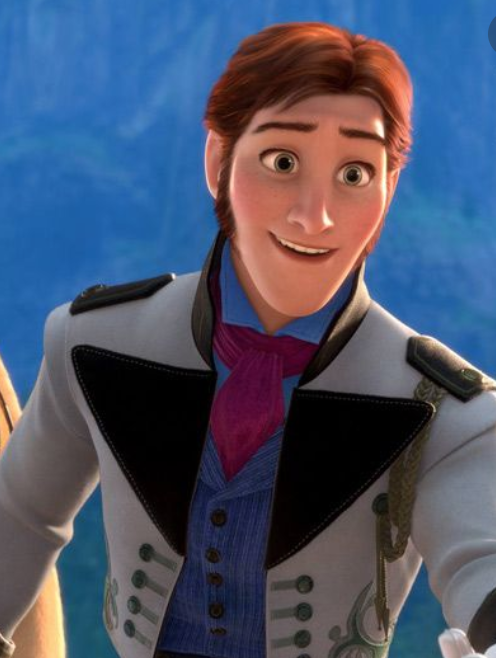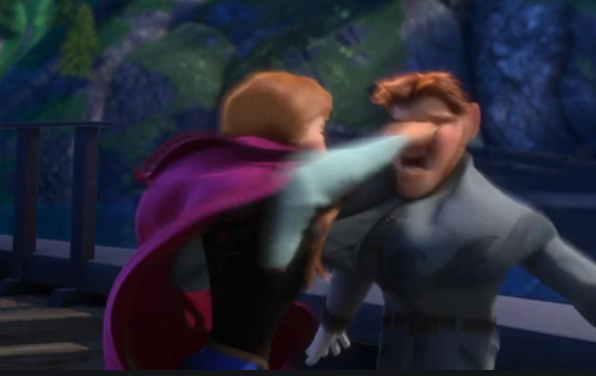Why Hans from "Frozen" is an Important Character for Young Girls to See
Originally wrote this piece January 2018
While I was watching “Frozen” (yes, the film with the terrible “Let It Go” song) with my four nieces and nephews, all of whom are under the age of six, something hit me.
On a previous occasion watching the movie, my brother-in-law complained that the men in the film are portrayed badly. The first character that came to mind was the handsome Prince Hans, who seems like the perfect man, but it turns out his alternative motive is not so regal.
My first reaction to this remark was ‘welcome to the club’, dude. Women in general are not portrayed well in most movies and especially Disney movies. My second reaction was that it’s an animated Disney movie, so chill out about analyzing the portrayal of men and women and take it with a grain of salt, for goodness sake.
But I thought about it more and realized that Hans is actually a real threat.
In the film, Prince Hans comes to the kingdom as a guest for Princess Elsa’s coronation as queen. Her younger sister, Anna is excited about all the new people visiting and meets Prince Hans. She gets her hopes up by believing he is everything she wants in life. He looks good on the outside, he’s charming, and he acts like everything Anna wants. But later, she finds out that it’s just a facade he puts on to get what he wants in the end — the kingdom. He is selfish and manipulative, and will stop at nothing to get what he wants.
And this is what some people do in real life. Frankly, the reality is that the biggest danger to women is men like Hans.
Disney movies are notorious for having obvious villains. You know who is bad and who is good based on their black or dark clothing, their evil eyebrows, or their ominous stance.
The men portrayed in Disney movies are either obviously bad guys (Jafar, Gaston), or just handsome princes that princesses want to marry (which by the way isn’t a good way for men to be portrayed either, but I don't hear anyone complain about how men are portrayed in Cinderella or Snow White). So actually after seeing men in other Disney movies shown as obvious villains, it’s actually refreshing to see a Disney character who is similar to the grey area of real life.
It’s not always black and white on who is going to hurt you in real life. Children who grow up on Disney movies are shown obvious villains, but not real life villains. They are not shown characters with many layers who could look good on the outside, but might change their ways in a room when no one is looking.
That’s not to say all men are bad in Frozen. There are good male characters in the movie, as well.
In the story, Elsa’s coronation goes awry and she runs away. Her sister, Anna has to take on a journey to find her and on this journey, she meets Kristoff and tells him about Hans.
“You are going to marry a guy you just met?” Kristoff asks her. He doesn’t know her at this point, he’s not looking out for her, he’s looking out for her as much as any human would. He’s asking the realistic question ‘is that such a good idea?’
It’s good for girls and boys to see this logical, caring character in contrast to the manipulative Hans. Kristoff is the logical, emotional thinker and turns out to be a great companion and friend to Anna throughout the story.
After failing to get her sister Elsa to come home with her, Anna gets back to the kingdom to find Prince Hans has manipulated everyone into thinking he’s a worthy prince, so that when he kills Anna, it can be more convincing when, “with a heavy heart” he takes over the kingdom. Anna is completely taken aback that Prince Hans could be so heartless.
This character can teach our children (and us) to learn to be wary of people who might be tricking you, who might change when an adult’s not around or behind closed doors, and also listen to your gut and others who point out something doesn’t seem right.
Let’s take a real life example of the shooting in Las Vegas. The perpetrator, Steven Paddock, a 64-year old with no criminal history and “no known affiliations with terror groups rained bullets down into a crowd at a country music festival, killing at least 59 people and injuring hundreds more”, stated the Washington Post.
He was a normal guy who no one suspected anything out of the ordinary was going on with him. And he ended up being “pure evil” according to President Trump. Evil, and a psychopath only interested in killing as many people as he could. From the outside he seemed “normal”, but he ended up making the worst mass shooting in American history.
The #MeToo campaign on Twitter and Facebook showed the world how prevalent sexual assault actually is. Only 30% of sexual assault cases are reported to authorities times. The National Institute of Justice reports that, “about 85 to 90 percent of sexual assaults reported by college women are perpetrated by someone known to the victim” and according to Saffron Center, “90% of child sexual abuse victims know their perpetrator”. There is fear and shame associated with knowing your abuser.
And sometimes it’s not all black and white; good people do bad things or bad people can appear good. The Hollywood Sexual Misconduct Scandal makes this point well, with over one hundred public figured were accused with sexual assault allegations. These are prominent, talented actors/directors/producers/musicians/announcers/politicians have done a lot of good for the world in entertainment, public service, etc, but have also acted immorally and performed different levels of sexual misconduct.
It’s a grey area that has been left unspoken for so long. Instead of accepting the victim’s side, the common reaction is “boys will be boys” or that that’s just how it is. It’s exciting to see that instead of victim blaming and saying, “he couldn't have abused you, he’s such a great writer/director/politician/president,” we are starting to accept the victim’s case and showing that there is accountability with their actions.
According to the Nation Children’s Alliance, almost 700,000 children are abused every year and 61% of those cases involve an adult the child knows who is not the parent (unfortunately 39% of cases of child abuse involve a parent). It’s a good lesson for children to learn to be aware that manipulative, hurtful people exist and to watch out.
When I think about my nieces and nephews growing up in this world, I worry about them being taken advantage of or worse things happening to them. I worry about their role models and who they will look up to.
Teaching our children about the gray areas that exist within human personalities and arm them with the emotional tools to navigate a situation that might not be easy to decipher how to react. Listen to your gut and get an adult when something doesn’t feel right. And if you are an adult, get out of a situation that feels wrong. It takes strength and courage to do what you feel is right.
If we could all be as badass as Anna and punch these “Hans”’s in the face!


